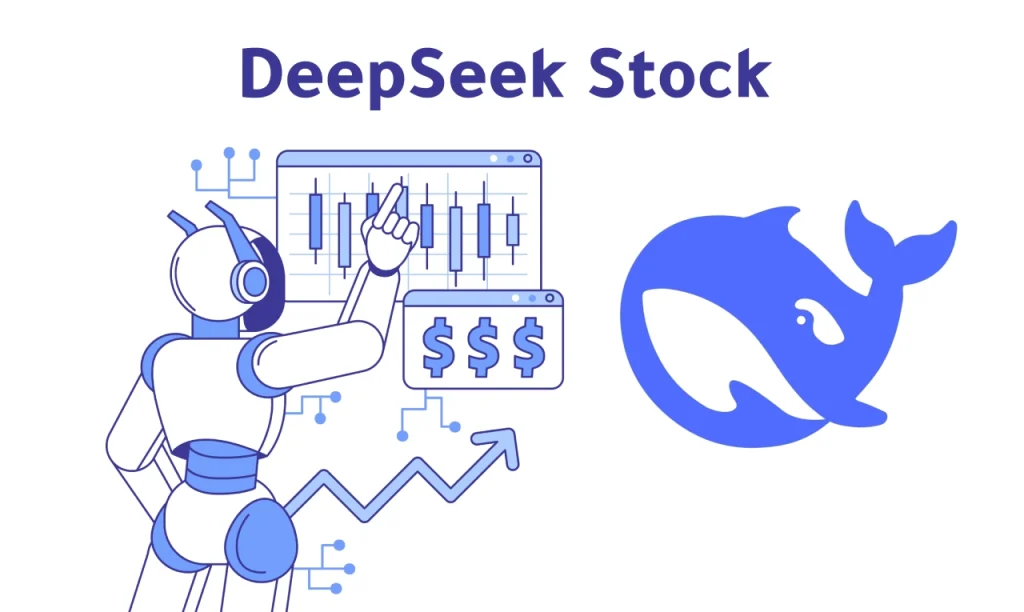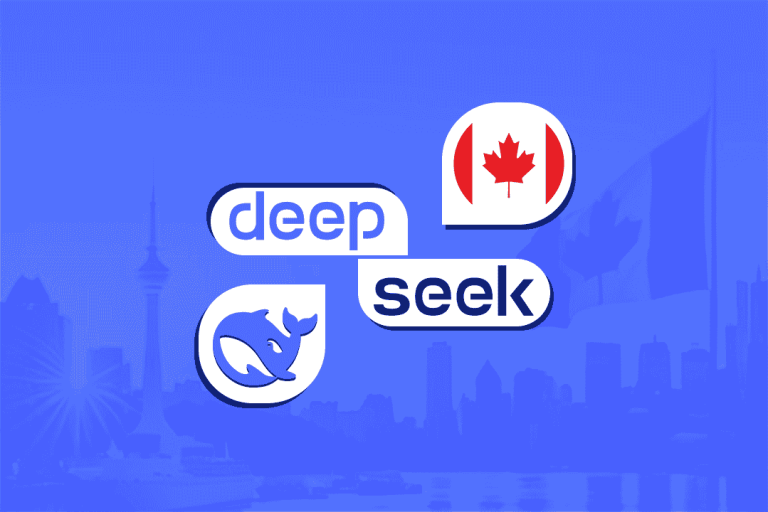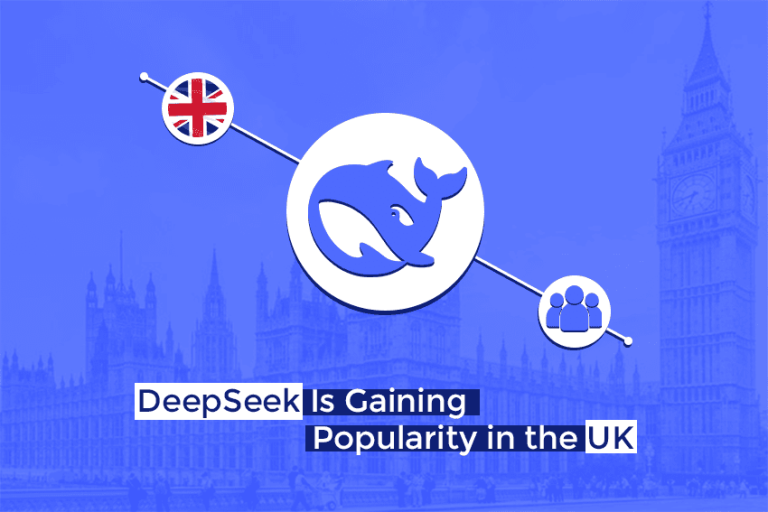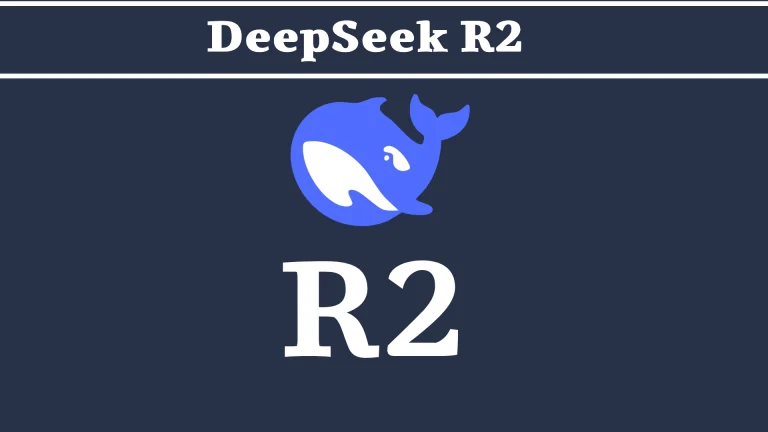The rapid rise of DeepSeek AI has not only shaken up the tech world – it has also caught the eye of investors large and small.
After headlines about DeepSeek’s AI beating expectations and even topping app download charts, many people are asking: Can I buy DeepSeek stock? In other words, is DeepSeek a publicly traded company, and if not, how can one invest in this AI phenomenon? In this article, we’ll answer those questions and provide a clear overview of DeepSeek’s corporate status and what investment options (if any) exist.
DeepSeek’s Company Status: Private Startup, Not Publicly Traded
No, DeepSeek is not a publicly traded company. As of 2025, DeepSeek remains a private startup and has no stock ticker symbol or listing on any stock exchange.
You won’t find “DeepSeek Inc.” on the NYSE, NASDAQ, or Shanghai exchange – it simply isn’t on the market.

DeepSeek is fully owned and funded by the High-Flyer hedge fund (based in Hangzhou, China), which was co-founded by DeepSeek’s CEO Liang Wenfeng.
This means High-Flyer is the sole investor in DeepSeek, and there are no outside shareholders or venture capital firms holding equity that you could buy into.
The startup’s financing all comes internally from that hedge fund’s resources.
Because of this private ownership, there is no “DeepSeek stock” available for public purchase.
There is also no official stock price for DeepSeek – any quoted “value” of the company is speculative, since private companies don’t have to disclose financials or market caps.
In short, you cannot directly invest in DeepSeek through any standard brokerage or trading platform at this time.
It’s worth noting that this setup – staying private in early years – is common for high-potential tech startups.
DeepSeek is barely two years old and is still focusing on research and product development. The company’s backer (High-Flyer) is a large fund with deep pockets, reportedly managing around ¥100 billion (~$15 billion) at its peak.
Thanks to this strong backing, DeepSeek hasn’t needed to raise money from public markets or outside investors.
In fact, when DeepSeek was spun off in 2023, many venture capital firms declined to invest, seeing it as a long-term project unlikely to provide a quick “exit” (such as an IPO or acquisition) in the near future.
This hints that an IPO was not in the short-term plans for the company.
Will There Be a DeepSeek IPO Soon?
Given the intense interest in DeepSeek, one might wonder if the company plans to go public in the foreseeable future.
As of now, there is no announced IPO or timetable for DeepSeek to offer shares to the public.
The leadership has not made any statements about listing the company on an exchange, and no filings have been made for an initial public offering.
In fact, analysts suggest an IPO could be years away – if it happens at all.
There are a few reasons for this uncertainty:
- Ample Private Funding: Because DeepSeek’s parent fund (High-Flyer) continues to finance its operations, the company doesn’t currently need to raise capital via public markets. Many startups go public primarily to access more funding, but DeepSeek’s unique situation provides it funding without public shareholders. This reduces the urgency to IPO.
- Business Model and Early Stage: DeepSeek is still in an early, hyper-growth stage focusing on building out its AI models and user base, rather than generating profits. Companies at this stage often hold off on IPOs until they have a clearer path to revenue and can satisfy public-market investors. DeepSeek might follow a trajectory more like OpenAI (which remains private with strategic investors) than a typical tech IPO startup.
- Regulatory Considerations: Being a Chinese AI company, DeepSeek would face additional considerations on where to list (e.g., Hong Kong vs. U.S.) and compliance with various regulations. Chinese authorities have shown caution about overseas listings for sensitive tech firms, and U.S. regulators scrutinize Chinese IPOs as well. This environment could delay or complicate any plans to go public abroad. It’s possible DeepSeek might never list in the U.S. due to geopolitical concerns, and any future listing might happen in China or Hong Kong if at all.
In summary, no IPO is on the immediate horizon for DeepSeek.
The company seems content to remain private and focus on its product – which means retail investors won’t be owning a piece of DeepSeek anytime soon.
DeepSeek’s CEO Liang Wenfeng reportedly still owns around 84% of the company (through High-Flyer), maintaining tight control.
Until we hear otherwise, we should assume DeepSeek will stay privately held for the foreseeable future.
How Can You Invest in or Profit from DeepSeek’s Success?
Since you can’t buy DeepSeek shares directly, what are the options for investors who believe in the AI trend that DeepSeek represents? Here are a few considerations:
- Indirect Investment via “Sympathy Plays”: When a hot startup isn’t public, investors often look to buy stocks of other companies that might benefit from or be affected by that startup’s rise. This is sometimes called a “sympathy play.” In the case of DeepSeek, its emergence has ripple effects across the tech industry – so one could invest in those affected companies. For example, chipmakers like Nvidia saw stock volatility when DeepSeek announced its efficient AI model (Nvidia’s GPUs are used in AI training, so a potential reduction in demand hit its stock). Some traders viewed Nvidia’s dip as a buying opportunity, believing AI hardware will still be in high demand. Similarly, big tech companies such as Microsoft (which backs OpenAI) and Alphabet/Google (developing its own models like Gemini) have a stake in the AI race. If DeepSeek’s low-cost model forces these firms to adapt or invest more in AI, it could influence their long-term stock performance. In fact, when DeepSeek’s success made headlines, many AI-related stocks moved – Meta (Facebook), enterprise software firms, and even data center infrastructure companies like Vertiv saw traders speculating on how they might gain or lose from the “DeepSeek effect”.Investing in established companies that are tangentially connected to DeepSeek’s tech (either as competitors, suppliers, or beneficiaries of cheaper AI) is one way to ride the trend without owning DeepSeek itself.
- Invest in Comparable AI Companies: DeepSeek underscores the growth potential in AI. While you can’t buy DeepSeek, there are publicly traded companies working on similar cutting-edge AI projects. For instance, you might consider stock in Nvidia (for exposure to AI hardware demand), Microsoft (a major player in AI via its OpenAI partnership and Azure AI services), Alphabet (Google) (with its own advanced models and vast AI research), or even smaller AI software firms. Some investors are also looking at Chinese tech companies or funds if they want exposure to China’s AI advancements – however, note that DeepSeek itself is not part of any larger public Chinese tech firm (it’s independent under a hedge fund). Another angle is companies that have AI portfolios or investments; for example, some venture capital firms or tech conglomerates that are publicly traded might indirectly benefit from AI breakthroughs. In short, those bullish on AI’s future can invest in the broader sector’s leaders, since DeepSeek’s rise validates the significance of AI technology as a whole.
- Private Equity and Pre-IPO Markets: For accredited investors, there is theoretically the possibility of trying to invest in DeepSeek before an IPO (a “pre-IPO” investment). Some private equity marketplaces (like Forge Global, EquityZen, etc.) list high-profile startups and facilitate trading of their private shares. Indeed, DeepSeek appears on some private-share platforms’ radars. However, because DeepSeek’s ownership is concentrated (High-Flyer and insiders), it’s unclear if any equity is actually available to trade. There have been no reports of secondary market transactions in DeepSeek stock as of early 2025. If any shares did become available (for example, if an early employee or the fund chose to sell a small stake), they would likely be accessible only to qualified institutional buyers and at lofty valuations. For the average person, this route isn’t practical – but it’s mentioned for completeness. Essentially, until DeepSeek decides to open up to outside investors, these platforms won’t have much to offer beyond speculative interest.
- Beware of Scams or Unrelated “DeepSeek” Securities: As an aside, it’s important to mention that whenever a hot startup is not publicly traded, there can be scams or confusion in the market. Already, there have been reports of a cryptocurrency token named “DeepSeek AI” appearing on crypto exchanges. Despite the name, such tokens are not shares of the DeepSeek company – they are likely unrelated projects attempting to piggyback on the name’s popularity. Always do due diligence; currently DeepSeek has no official cryptocurrency or affiliate stock, so anything claiming to offer a piece of DeepSeek is not legitimate. Stick to known, regulated investment channels.
The “DeepSeek Effect” on Stocks
Even though you can’t invest in DeepSeek directly, the company’s rise has had real effects on publicly traded stocks worldwide.
This is useful to understand for any tech investor.
As mentioned, when DeepSeek’s R1 model was unveiled and its app gained millions of users, it caused shock in several sectors:
- AI & Tech Stocks Reaction: The day after DeepSeek topped the App Store, many AI-related stocks saw a downturn. Notably, Nvidia’s stock fell ~18% at one point (a huge single-day move) as traders feared that DeepSeek’s low-cost approach could reduce the AI industry’s reliance on expensive hardware. Other semiconductor stocks and cloud-computing firms also slipped. This event was even covered by NPR and Bloomberg, emphasizing how a small Chinese startup triggered a reassessment of valuations in big tech. On the flip side, certain companies were upbeat about cheaper AI – for example, some software companies or AI-driven app makers welcomed the idea of more accessible models.
- Long-term Opportunities: Once the initial shock passed, investors began hunting for winners from DeepSeek’s breakthrough. For instance, if DeepSeek’s models reduce AI development costs, that could expand AI adoption, benefiting companies that integrate AI into products. Enterprise software firms, cloud providers, and even industries like biotech (which use AI for R&D) could gain. Additionally, companies that compete with DeepSeek (like OpenAI, Google, Anthropic) might double down on improvements – which, for publicly listed backers (e.g. Google or Microsoft), could eventually strengthen their product offerings. As a trader or investor, one strategy is to monitor which public companies adapt positively to the “DeepSeek era”. Those that leverage cheaper AI might improve their margins or innovation pace.
In essence, DeepSeek’s advent is a signal that AI progress is accelerating and becoming more globally distributed.
Investors can take this as a cue to ensure their portfolios have exposure to the AI sector, whether through individual stocks or broader tech ETFs, while being mindful of shifting competitive dynamics.
Key Takeaways
- DeepSeek is not public: You cannot buy DeepSeek stock at this time. The company is privately owned (by a hedge fund) and has no ticker symbol or public financials.
- No IPO imminent: There are no official plans for a DeepSeek IPO in the near future. An initial public offering could be years away, if it ever happens, given the company’s strong private funding and focus on research over revenue.
- Don’t fall for “DeepSeek stock” pitches: Any offer to sell you “DeepSeek shares” or similar is likely fraudulent. Also, unrelated assets like similarly named crypto tokens are not actual DeepSeek investments – the real company has not released any public investment vehicles.
- Investing indirectly: If you want to capitalize on DeepSeek’s success or the trend it represents, consider investing in established companies involved in AI. Think of companies that supply AI technology (chips, cloud services) or those using AI to transform their business. Many of these saw stock movement due to DeepSeek, highlighting where the market’s attention is.
- Monitor the AI industry: DeepSeek’s rise is an important development in AI, but it’s part of a larger landscape. Keep an eye on major AI advancements from both startups and big players. Sometimes the best “investment” is simply staying informed and ready to act when market perceptions shift. As DeepSeek has shown, disruption can come from anywhere – and understanding that dynamic is key for tech investors.
Bottom Line
DeepSeek AI might be the talk of the tech world for its groundbreaking model and viral app, but as an investment, it remains off-limits to the public.
For now, the best you can do is watch how its story unfolds and position your portfolio in companies that ride the wave of AI innovation.
In the future, if DeepSeek ever does go public, it will undoubtedly attract enormous interest – but until then, any “DeepSeek stock” is just a fascinating idea, not a purchasable reality.
Stay tuned, stay savvy, and remember that the absence of a direct investment doesn’t mean you can’t benefit from the broader trends DeepSeek exemplifies.



